- Home
- Julie Hyzy
Eggsecutive Orders
Eggsecutive Orders Read online
Eggsecutive Orders
Julie Hyzy
"Hyzy's research into the backstage kitchen secrets of the White House gives this series a special savor that will make you hungry for more." – Susan Wittig Albert
***
Chef Olivia Paras has too many eggs in one basket-and is feeling like a basket-case…
When NSA big shot Carl Minkus dies right after eating the dinner Olivia Paras's staff had prepared, all forks point to them. Now the Secret Service is picking apart the kitchen-and scrutinizing the staff's every move. The timing couldn't be worse with the White House Lawn Easter Egg Roll to prep for without access to a kitchen. Olivia must find the real culprit-before she cracks under pressure.
Julie Hyzy
Eggsecutive Orders
The third book in the White House Chef Mystery series, 2010
For my daughters, and in memory of my mom
ACKNOWLEDGMENTS
Sincere thanks to the great people at The Berkley Publishing Group, especially Natalee Rosenstein and Michelle Vega. And to copyeditor Erica Rose. And to the folks at Tekno, especially Marty Greenberg, John Helfers, and Denise Little.
A big and special thank-you to my daughter Sara, who always reads first.
It’s great to have experts to turn to-and my sincere gratitude to Diane Springer who-between VJA marching band competitions-helped me come up with an efficient way to kill a character. Any and all errors with regard to this method, and its subsequent discovery, are mine.
Thanks to reader Barbara Czachowski for her catch in State of the Onion. Ollie greatly appreciated Barbara’s kind correction and made note of it in this adventure while she and her family toured the National Mall.
Thanks to Mystery Writers of America, Sisters in Crime, and Thriller Writers of America for camaraderie and support, and thanks especially to wonderful readers who take the time to let me know what they think of Ollie’s adventures.
CHAPTER 1
THE PHONE RANG WHILE I WAS BRUSHING MY teeth. Phone calls at four in the morning usually mean one thing: bad news.
I quickly swished water in my mouth to clear away residual foam, and hurried to my bedroom to stop the unnerving jangle.
As executive chef at the White House, I make it a point to get to work every morning before the sun comes up, so I reasoned that this might be one of my staff catching me at home to call in sick. Either that, or my mom and nana were having trouble getting to the airport. Despite the fact that our kitchen had a lot to do before the Easter Egg Roll next week, I sorely hoped this was, indeed, a staffer calling in. I didn’t want to think that my mother and nana might cancel their plans to visit me.
I reached for the handset. A split second before I answered, I glanced at the Caller ID.
Not my mom. Not a staffer.
The display read simply: “ 202.”
The White House was calling me.
“Olivia Paras here,” I said as I picked it up.
“Ollie, it’s Paul.” Paul Vasquez, the White House chief usher, wouldn’t call me at home unless it was a dire emergency.
“What happened?” I asked.
“There’s a car waiting for you downstairs.”
“Downstairs, here?” I asked. Although I’d been awake for nearly an hour, my brain was slow to comprehend. “Downstairs where I live?”
“That’s right,” he said slowly. “Two agents will escort you to the residence today.”
“Why? What happened?”
“You’ll be briefed when you get here. Just hurry. They’re waiting for you now. Follow their lead.”
“But-”
“Ollie.” His tone forced me to focus.
“Yes?”
“For God’s sake, don’t say anything to anybody.”
He hung up before I could ask what he meant.
Two Secret Service agents were waiting for me in the lobby when I came out of the elevator. Both male, both large, they were clad in nearly identical outfits of navy pants and gray sport coats, and wore similar buzz-cut hair. In a more chipper situation, I may have asked them if they were Tweedledee and Tweedledum, but I didn’t recognize either of these guys, and neither wore an expression that encouraged levity.
The one closest to me nodded solemnly. “Ms. Paras?”
I nodded back.
“This way,” he said. He started for the front doors, gesturing for me to walk directly behind him. I couldn’t see around his broad back, and was about to step aside when his twin came in close behind, effectively making an Ollie sandwich.
I started to ask, “Why all the-”
But shouts from outside drowned out my question. “There she is!”
I still couldn’t see much, but just as the damp morning air hit my skin, the sound of agitated scuffles reached my ears. A crowd rushed up, encircling us. Stark bright lights silhouetted the agent in front of me. I winced at the intensity and at the sharp shouts: “Ms. Paras, Ms. Paras!”
In an effort to see better, I started to move around Agent Number One, but Number Two placed a restraining hand on my shoulder. “Keep moving.”
Half-turning, I started to ask what was going on, but the agent gripped harder, urging me forward.
Someone thrust a microphone into my face-and kept up with our brisk pace until the agent behind me strong-armed him away.
A woman’s voice, shrill and plaintive: “Ms. Paras! What went wrong at dinner last night?”
Instinctively I turned. The agent tightened his grip on my shoulder, but that didn’t stop me from hearing another voice boom: “What was in Carl Minkus’s food?”
My right foot bumped the agent in front of me and I stumbled. Tweedledum’s hold prevented me from falling on my face.
“She fainted!” someone yelled.
“No I didn’t!” I shot back.
“You didn’t?” someone shouted. “You’re saying this wasn’t your fault?”
A female voice this time: “Then what killed Carl Minkus?”
That stopped me. “What?” Carl Minkus was dead?
The two agents trundled me forward into the waiting car. A third agent held open the big black car’s rear door as Tweedledee stepped to one side. The enormous men formed a wall on either side of me, with only one path open for me to go. I scrambled to safety.
Media mongrels clambered around the open door until the agents bulldozed them back. Amid all the shouting, I heard one high voice ring out: “What was in his food? And who prepared it?”
One of the Tweedles lowered himself next to me. I scooched to the other side, where reporters peered in the side windows. Armed with microphones and manic inquisitiveness, they banged on the glass, straining to be heard.
The agent next to me pulled his door closed, effectively hitting the mute button on the craziness outside. I was bewildered by the sudden realization that we were in one of the agency’s bulletproof vehicles. We pulled away slowly, then picked up speed as the gaping pack of news guerillas fell away.
I resisted the temptation to sink into the vehicle’s soft leather seats and make myself small. Instead, I perched forward, facing the agent next to me. “Carl Minkus is dead?”
His twin was driving, the third agent next to him in the passenger seat.
Agent Number Three was a little younger than his counterparts-smaller, too. And while the Tweedles remained stone-faced, Number Three blinked at my question.
I focused on him. “What is going on?”
With his defined jawline and classic profile, Number Three reminded me a little of Tom. Younger though. He had the look of a newbie Secret Service agent.
When he blinked again, and started to turn, the agent next to me spoke up. “You will be briefed when we arrive,” he said.
The agent in the pa
ssenger seat licked his lips and shifted his eyes front.
I sat back, trying to piece things together. Carl Minkus was a big shot with the National Security Agency. I didn’t remember his exact title with the NSA, but I knew he was as much admired as he was feared. He’d been a bulldog fighting terrorism. Alone, he’d been responsible for the prosecution of more than a thousand suspected terrorists. Lately he’d turned his sights inward, accusing American citizens of terrible deeds. He’d gone after several high-profile celebrities, and had ruined more than one career. Some people called him the Joseph McCarthy of terrorism. Last night he’d been among the president’s guests at dinner, but I didn’t know whether the president had invited him to chastise or to congratulate.
Minkus, in his mid-fifties, was a vibrant, outspoken defender of the republic. My shoulders jerked in an involuntary shiver and I tried to suppress the wave of panic shooting up my chest. Good thing it was dark in the car-I felt the heat in my face and knew it was as red as a beefsteak tomato. Minkus had been at dinner last night, now he was dead, and the press was already blaming me and my kitchen.
But… it wasn’t our fault. Was it?
Rubbing my temples, I reviewed last night’s menu. Except for Minkus being a recent convert to vegetarianism, he had no other dietary restrictions. No allergies. Minkus wasn’t vegan. Which meant that dairy and eggs were allowed.
Did we serve him an item we shouldn’t have? I stopped myself. How ridiculous! The White House kitchen was freakishly conscientious about our guests’ dining preferences. Minkus would not have been served anything that conflicted with his needs. And, even if he had accidentally ingested a meat product, it certainly wouldn’t have killed him.
No, I reasoned, even as my knee bounced a panicked tempo, he must have had an aneurysm or something. That had to be it. Or maybe an undiagnosed heart condition. Something unpredictable. Maybe his recent switch to vegetarianism was to help combat high cholesterol. Maybe he was on doctors’ orders to lose weight. It couldn’t have been anything he ate. At least, not something we had prepared.
I looked at the three men accompanying me on our race to the residence. Not one of them returned my gaze. “I’ll be briefed, you said?”
One of the guys in front nodded.
My voice kicked up an octave, despite my attempts to keep calm. “And they think Mr. Minkus died because of something we served last night?”
No reaction this time.
“Well.” I folded my arms and sat back, striving for control. “As soon as I’m done being briefed, I’ll be sure to run a complete investigation of my kitchen.”
The agent driving the car met my eyes in the rearview mirror. “Already underway.”
I should have guessed, I thought. With a frown, I leaned back in the very comfortable seat, although at the moment I was anything but.
CHAPTER 2
I WISHED WE WOULD JUST GET TO THE WHITE House already. Despite the car’s speed, I felt like we were moving in slow motion. I wanted to get there-and get everything settled. Now. But no matter how hard I willed it, I couldn’t make the limo move faster.
Still dark at this hour, the streets were wet from heavy overnight rains. Our tires sliced through deep roadside puddles, hammering dirty water against the side of the sedan every time we took a turn. I touched the thick window and hoped the storms hadn’t delayed incoming flights. My mother and nana were coming to visit me-for the first time. I’d been begging them to make the trip, almost since my first day at the White House, but they’d come up with excuse after excuse. I knew my mother was a reluctant flyer, and my nana had never been on a plane. Fear of the unknown kept them in Chicago, and now that I’d finally convinced them to come visit me, I should have been ecstatic.
I wasn’t. I was panicked. Today was now in turmoil. I had planned to get breakfast finished and lunch started before heading to the airport to pick up my family. Instead, I was racing along the streets of D.C. in a specially armored limo because one of the guests I’d fed last night was dead.
I leaned toward the bulletproof glass and tried to see the sky. God, I hoped their plane wasn’t delayed. It might be all the reason they needed to cancel the trip.
“My cell phone!”
The agent next to me startled at my exclamation.
I grabbed at my purse. Even as I pawed through its cavernous pockets, my heart dropped. The early morning call from Paul had thrown me off and I’d left the cell phone charging at home.
How would my mother get in touch with me?
I gripped my hands into fists and shut my eyes against the frustration of it all. Now she wouldn’t be able to reach me.
“We have to go back,” I said.
The agent next to me shook his head.
“My cell phone,” I said again, in case he’d missed my distress. “I forgot it.”
“You’ll have to do without.”
“But my mother is-”
“Sorry, Ms. Paras. Our orders are to bring you in as quickly as possible.”
Oblivious to my concerns, the agent in the passenger seat spoke into a microphone. I couldn’t make out what he said, but I wasn’t focused on him as much as I was on my own irritation. Great. Of all days to leave my cell at home, I’d picked the absolute worst. Not only did I not know what was in store for me, I wouldn’t know how Mom and Nana were progressing on their trip. I would be incommunicado until these agents saw fit to set me free. I would have to make other arrangements for my family, but at this moment, I couldn’t quite figure out how.
Lost in my ruminations, I didn’t catch what the driver said, but the next thing I knew bright lights surrounded us and a crowd of news media swarmed the car. They glowed like ethereal monsters clawing and reaching, shoving cameras and microphones at the bulletproof glass. I shrunk down in my seat as spotlights swept the car’s interior. For the first time, I wished it was still storming. Then maybe these vultures would disappear. Dissolve on the ground like a hundred Wicked Witches of the West. But instead of stealing their brooms and handing them off to the Wizard of Oz, I’d be content to grab their microphones and crush them beneath my heel.
I hadn’t had the happiest relationship with the press since my promotion to executive chef. They liked to portray me as a lucky bumbler. It didn’t matter that I’d won awards, or that my menus were respected by prestigious culinary experts. What mattered was that I’d gotten myself in the middle of an assassination plot, and followed that up with a disastrous-though ultimately laudable-holiday spectacle. In order to sell newspapers and magazines, they’d portrayed me as either a good-luck charm for this administration, or as a fumbling cook who fed the First Family and, between courses, fought off assassins.
The press didn’t know the real me. But the First Family did. What I wanted, more than anything, was for my mom to see me in my element. To understand that I was not just a cook, but a respected member of the White House staff.
I rubbed my forehead as we pulled through the security gates. This wasn’t what I’d hoped for when my mom came to visit. For a chef, this situation-a dead dinner guest-couldn’t be worse.
CHAPTER 3
TWO AGENTS ACCOMPANIED ME TO A UTILITARIAN office on the second floor of the East Wing. Although it was no larger than ten by twelve, the area felt cavernous with its high ceilings and spartan furnishings. Blue-draped windows, white walls, and a man at a desk, scribbling. Two other agents flanked him.
I was hoping to see Tom there. No Tom. Not a single other Secret Service agent I could call a friend.
My escorts left me there, and the large man behind the desk gestured me forward. He glanced at his notes. “Ms. Paras?” He didn’t smile. “Sit,” he said, pointing. “Please.”
I sat.
Jack Brewster kept his gaze on the papers before him, as he massaged his wide-set nose. “You know who I am?”
“Yes.” I had met the assistant deputy of the Secret Service a long time ago, but he probably didn’t remember.
He frowned. “Your nam
e comes up in my files with increasing regularity.” Still without looking up, his scowl deepened and he shook his head, as though he’d just smelled fish left out overnight. “You know why you’re here?”
“Is Carl Minkus…” I stumbled over the words, “really dead?”
Bulging eyes finally met mine. His were bloodshot and yellowed-from lack of sleep, or lack of happiness, I couldn’t tell. Maybe a combination of both. Brewster cleared his throat, but it came out like a growl.
“That is correct. Agent Minkus is dead. His body was taken from the White House last night.”
“But I was here last night. Why didn’t anyone tell-”
“Why should anyone tell you?”
I blinked. “Because… I mean…”
“Ms. Paras, contrary to your apparent belief, you are not the hub of information here in Washington.”
That stung. I bit my lip as he continued.
“You obviously came to that conclusion due to the press’s interest in your antics here at the White House.” Under his breath he murmured, “If it were my decision you’d be out on your-”
“Mr. Brewster,” I said sharply.
He looked up.
“I don’t think of myself as a ‘hub of information’ as you put it,” I began, anger bubbling up. “I’m only suggesting that if I’d been notified last night that Mr. Minkus had collapsed, maybe I could have started looking into things last night.” I emphasized the words. “And by now we would have determined the kitchen’s role-or lack thereof-in Mr. Minkus’s demise.”
He leaned toward me, thumping meaty forearms on the desk. “They told me you were a handful.”
I bit the insides of my mouth. “I prefer to think of myself as proactive.”
“Call it what you like.” He massaged his nose again. No wonder it was so wide. “I’ve assigned a group of agents to determine your staff’s culpability in this situation. You are to cooperate with them. Fully. Do you understand?”

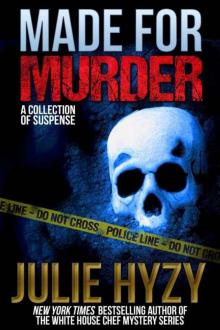 Made for Murder
Made for Murder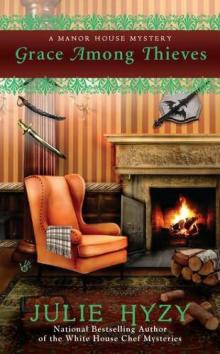 Grace Among Thieves
Grace Among Thieves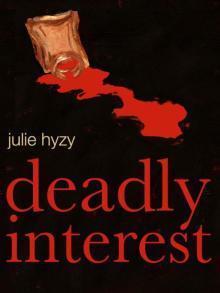 Deadly Interest
Deadly Interest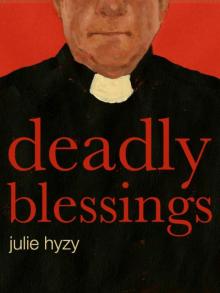 Deadly Blessings
Deadly Blessings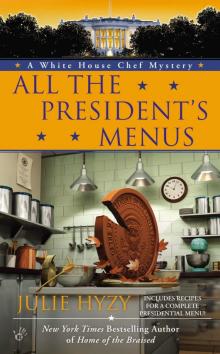 All the President’s Menus
All the President’s Menus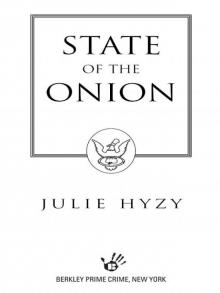 State of the Onion
State of the Onion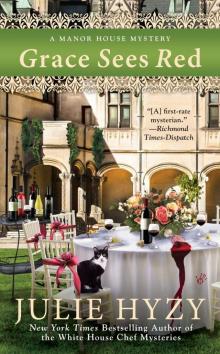 Grace Sees Red
Grace Sees Red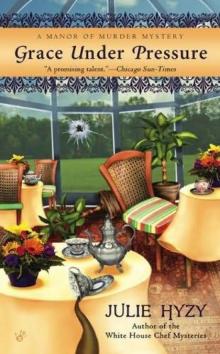 Whitehouse Chef 04 - Grace Under Pressure
Whitehouse Chef 04 - Grace Under Pressure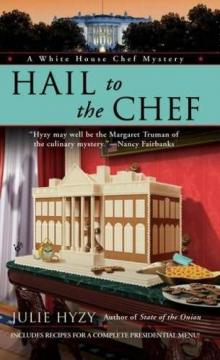 Hail to the Chef
Hail to the Chef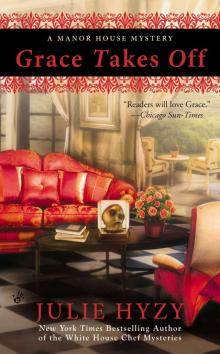 Grace Takes Off
Grace Takes Off Grace Against the Clock (A Manor House Mystery)
Grace Against the Clock (A Manor House Mystery) Grace Cries Uncle
Grace Cries Uncle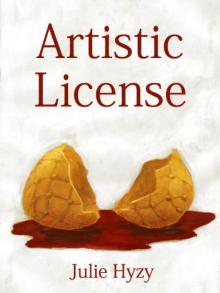 Artistic License
Artistic License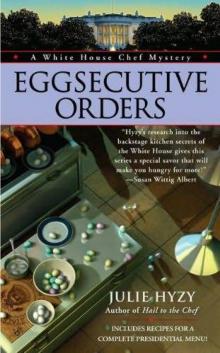 Eggsecutive Orders
Eggsecutive Orders Grace Interrupted
Grace Interrupted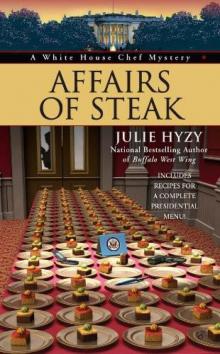 Affairs of Steak
Affairs of Steak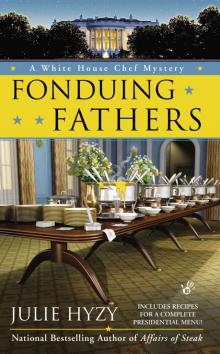 Fonduing Fathers
Fonduing Fathers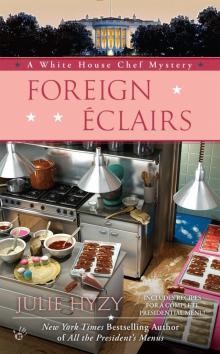 Foreign Éclairs
Foreign Éclairs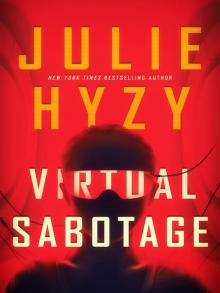 Virtual Sabotage
Virtual Sabotage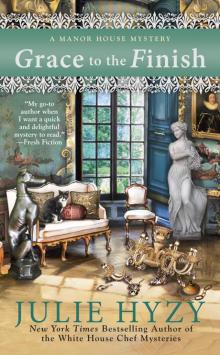 Grace to the Finish
Grace to the Finish